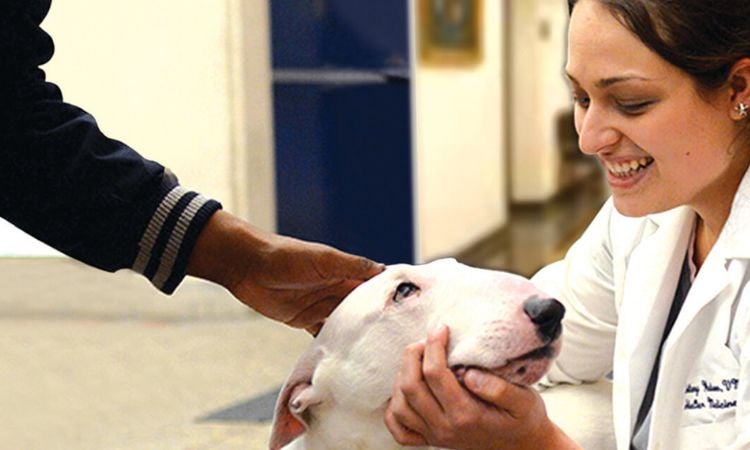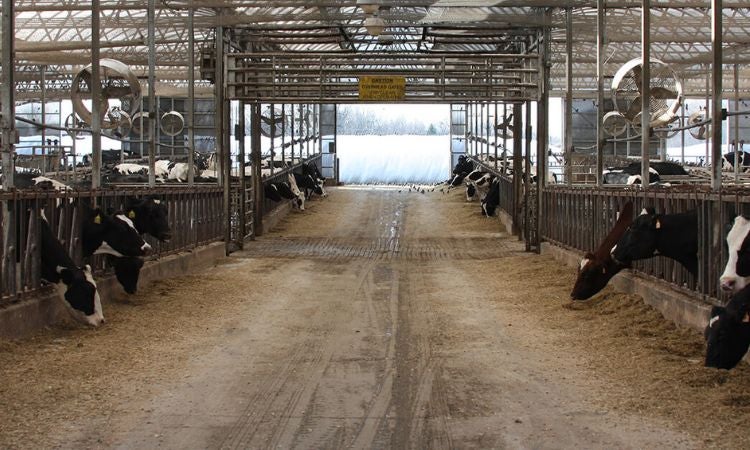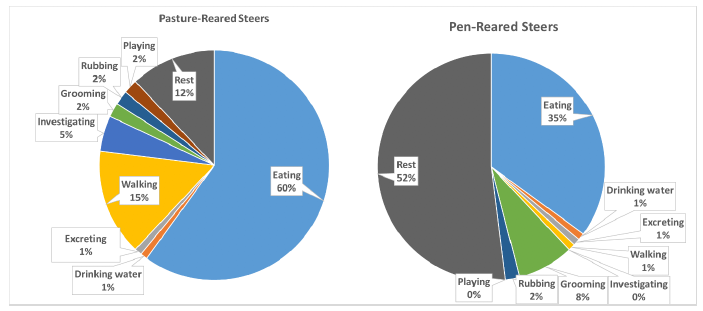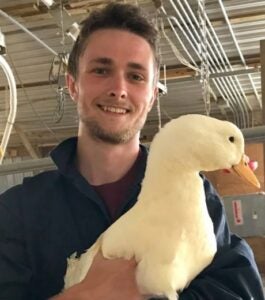Online Graduate Programs in Animal Welfare & Behavior
Whether you’re preparing for admission into veterinary school, seeking to advance your career or simply hoping to gain the tools to interpret animal behavior, the Animal Welfare and Behavior Graduate Certificate and Master’s of Science programs can be personalized to fit your individual continuing education needs.
Through individualized research topics, one-on-one mentorship, and faculty feedback via synchronous and asynchronous portions of the course, our program allows students to explore issues affecting animal welfare across a variety of species.
Online Graduate Certificate in Animal Welfare & Behavior

This four-course, for-credit graduate Certificate Program in Animal Welfare Science and Animal Behavior is designed for individuals working with animals in research, industry, and the nonprofit sector, as well as for those who are interested in developing careers in animal health and welfare.
Taught by nationally and internationally renowned Penn Vet faculty, it prepares students to understand and assess animal welfare and behavior.
Online Master’s of Science in Animal Welfare & Behavior

The Master of Science in Animal Welfare and Behavior is designed as an online program with an option for on-site research. It can be completed as a full-time program in a two-year period or as a part-time program over a longer period. Please see below for details of the curriculum.
All students enrolled in the MSc in Animal Welfare and Behavior complete core requirements. In addition, all MSc students are required to complete a capstone project, which must involve the generation of independent and original intellectual content.
About the Online Graduate Certificate
Details
Effort: 8–10 hrs/week
Language: English
Fall ’25 Classes Start: Late August
Price: $4,045/course
Application Open Date: Early October
Priority Deadline:
April 16, 2026
Application Close Date: May 16, 2026
Who is the Program For
The Certificate program is designed as an on-line learning program with a combination of asynchronous and synchronous features. It is designed for University of Pennsylvania graduate students who looking for a deeper understanding of animal behavior and scientific approaches to animal welfare. We also welcome graduate students interested in pursuing careers in animal health, welfare and policy, as well as veterinary students/veterinarians who would like to deepen their knowledge of animal welfare, behavior, and human-animal interactions.
There is a rising demand for individuals with a formal, science-based understanding of animal behavior and welfare. Employers are looking for professionals who can help them enhance the welfare of animals regionally, nationally and internationally, and respond to public concerns about these issues. These issues will be tackled in four 7-week long on-line core courses. To receive a Certificate, participants will be required to take all four courses.
Note: this program is only open to current Penn students in a different masters or doctoral program.
We offer one admissions cycle each year. Your application (including your personal statement, resume and transcripts) must be received by the deadlines below.
| Admission Cycle | Priority Deadline | Application Close |
| Fall 2026 | April 16, 2026 | May 16, 2026 |
- Completed Penn Graduate Programs application form
- Students will be asked to upload a personal statement that addresses the following:
- Your specific interest in pursuing the online Certificate in Animal Welfare and Behavior
- How you will benefit from attaining a Certificate, and more specifically how the Certificate will align with your eventual career goals
- Your approach to engaging and interacting in the online environment
- Accepted candidates will be required to pay a non-refundable enrollment deposit of $150.
- Essay — please respond to this question: In a recent study, mice who did not experience a painful stimulus but were housed in the same room with mice who did experience a painful stimulus demonstrated altered behavior. How do you interpret this finding and how might it relate to animal welfare?
- Bachelor’s degree: Advanced background in biology or animal science preferred.
- Academic Transcripts: Transcripts should include at least one college level biology course. Official transcripts are required prior to enrollment.
- Letter of Recommendation from current supervisor and/or teacher.
- Updated CV or Résumé
- Non-refundable application fee of $50.
Through this program, you will:
- Gain the background necessary to understand and engage in the public discourse on animal welfare.
- Increase your understanding of animal welfare problems by learning to recognize important behavioral and physiological signs.
- Build a professional network of peers to gain new perspectives, explore ideas, and discover new opportunities.
- Learn how to identify solutions to welfare challenges facing individual animals, organizations, and even industries.
- Gain an evidence-based understanding of animal welfare and behavior.
- Garner valuable experience in conceptualizing, writing and defending a research proposal integrating both theory and practice of animal welfare.
- Learn cutting-edge tools and frameworks from renowned faculty at the University of Pennsylvania’s School of Veterinary Medicine, and become part of a close network of people who are dedicated to animal welfare.
In addition, veterinarians who take the program will be better prepared for board certification by the American College of Animal Welfare.
Tuition and Aid
This program is not eligible for Title IV funding or financial aid. University of Pennsylvania and health system employees may use tuition benefits toward these courses. Please note that tuition benefit policies differ for University employees and health system employees.
The Foundation to Earn a PhD
I knew this master’s program would give me the foundation I needed to apply for a PhD … I learned a tremendous amount from the faculty, and also from my classmates, whose diverse backgrounds empowered a rich learning experience. A highlight of the program was the mentored research capstone project, which developed my skills in conducting research, analyzing data, and publishing my work.
Eilidh Gilbert, VG’23

Pursuing a Dream
For over a decade, I had dreamed of pursuing a Master’s degree in animal behavior and this program’s comprehensive curriculum made it the perfect choice … One standout feature of the program is the supportive community of peers and faculty, that made me feel at home from the onset. I leave the program, not just with knowledge and skills but also with a network that will enrich my future endeavors.
Sunday Agbonika, VG’25

About the
Online Master’s Program
Details
All students are required to complete a minimum of 48 CR or 8 CUs to meet the requirements of the MSc.
Price: $4,045/course
Application Open Date: Early October
Priority Deadline:
April 16, 2026
Application Close Date:
May 16, 2026
Who is the Program For
One of the most remarkable aspects of Homo sapiens as a species is how extensively we have coaxed, co-opted or coerced other animal species on the planet to serve our needs. Since man first domesticated animals over 10,000 years ago, we have benefited from animals providing us protection, transport, power, food, clothing, entertainment and companionship.
However, animal use raises questions about what we owe these animals in return for our benefits. Societal views about how man interacts with animals continue to evolve, continue to be debated and will reflect temporal, socio-economic or cultural perspectives. Animal welfare is the academic discipline that addresses both philosophical and scientific aspects of societal concerns about animal. Animal behavior is complex and intriguing, but also useful tool for understanding and improving animal welfare.
Our ideal applicants are working professionals in vocations focused on animal health and welfare who will benefit from a graduate program they can pursue while working full time.This group includes but is not limited to veterinarians interested in sitting for the Boards in the American College in Animal Welfare.We also welcome college graduates interested in pursuing a career in animal health or policy, as well as veterinary students who would like to deepen their knowledge of animal welfare and behavior. A bachelor’s degree that includes one college level biology course or an advanced background in biology or animal science is preferred.
- Non-refundable application fee of $50.
- Completed Penn Graduate Programs application form
- Academic transcript detailing performance in courses leading to the last academic degree the student received
- Current résumé
- Two letters of recommendation that address your qualifications for this program, your potential for research or similar novel scholarly activities, and your commitment to/interest in animal welfare or behavior.
- Personal statement that describes your motivation for participating in our research Master’s program as well as how you envision this program advancing your professional goals and aspirations.
- Interview: Candidates may be invited to interview with the the Admissions Committee.
- Essay: Please choose ONE of the following:
Essay #1: Twinky was a purebred Lavender Point Siamese spayed female house cat and lived her life in a single cat household with her owner. She was declawed, fed twice a day by her owner, and spent her days playing with toys and watching birds through the windows of the 10th story apartment in which she lived. At age 10, Twinky was diagnosed with severe dental disease and had most of her teeth removed and could only eat soft canned cat food after that. At age 12, she developed renal disease and lived the rest of her life having her owner manage her chronic illness until she passed at 15 years of age.
Billy was a crossbred domestic short hair intact male barn cat and lived with a group of six other cats at a dairy farm. He spent his days hunting for mice and birds as well as playing and, at times, fighting with the other cats on the farm. Billy survived on what he hunted and some of the discarded milk from the dairy. He walked with a limp, the result an untreated bite wound, was affected by parasitism most of his life, and was killed at 4 years of age when he was hit by a car as he crossed the road in front of the farm headed to hunt small rodents in the neighboring field.Please consider both cats’ life scenarios. In up to 500 words, formulate and articulate an argument as to which cat led a better life.
Essay #2: Below are the daily time budgets from steers raised either on pasture or in pens that describes how they allocate their time each day to different behaviors. Please compare and contrast the data presented and formulate and articulate an argument in 500 words or less as to which steers lead a better life.

Tuition and Aid
Tuition is assessed on a per credit basis. All students are required to complete a minimum of 48 CR or 8 CUs to meet the requirements of the MSc. Students should anticipate annual incremental increaes to program costs). Students in the MSc program will be eligible for financial aid and federal loans. In order to qualify for financial aid each student will need to take 12 CR equivalents per semester; we have specifically designed the program so that students can take this equivalent while continuing to work.
Fall 2025 – Spring 2026 Tuition Rates
3 CR (0.5 CU)
Tuition: $2,022.50
Online Services Fee: $81
Total: $2,103.50
6 CR (1 CU)
Tuition: $4,045
Online Services Fee: $162
Total: $4,201
AWB Career Outcomes
Graduates apply their training across diverse professional contexts, including animal welfare, biomedical research, advocacy, social work, and leadership roles within academic and industry settings. As members of a close-knit AWB alumni community, graduates maintain connections to faculty and staff who continue to support their career advancement.
Professional Paths After Graduation
Graduates have advanced into leadership roles, specialized research positions, and continued clinical practice.
Sample post-graduation outcomes include:
- Senior Staff Veterinarian, Charles River Laboratories
- Behavioral Rehabilitation Specialist, ASPCA
- Director of Animal Welfare Programs and Operations, University of Pennsylvania
- Primate Technician Supervisor & Safety Coordinator, Duke Lemur Center
- Director of Education, Veterinary Association for Farm Animal Welfare
- Marine Mammal Assistant I, SAIC
Additionally, some students have attained board certification through the American College of Animal Welfare (ACAW), while others have gone on to further advance their education through doctoral programs.
AWB Programs Information Session
Attend one of our upcoming sessions!
The faculty and staff of the One Health team at Penn Vet invite you to join us for our virtual information sessions (via Zoom). Meet program directors, faculty and recruitment staff for an in-depth look into all that the Graduate Certificate and Master of Science in Animal Welfare and Behavior have to offer. We look forward to answering your questions and helping you get started on the application process!
ACAW Certification: if you are a veterinarian interested in pursuing ACAW certification, please contact us to schedule a 1:1 meeting with an advisor to learn more about how the Animal Welfare and Behavior program can prepare you for certification. Please email onehealth@vet.upenn.edu.
Technical Information New to Zoom? Review the website.
Interested in learning more about the AWB programs?
Professional Gains
A colleague mentioned this program to me, and I was immediately intrigued … I appreciated that I could continue my career and study at the same time. During the capstone project I gained a lot of knowledge on how to strategically design a scientific study. This helped me a ton in my professional life.
Alba Pfaff, VG’25

Impactful Knowledge
I credit the extremely knowledgeable instructors and the courses they developed as the most important factors in helping me pass boards to become a diplomate of the American College of Animal Welfare. The knowledge I gained and the connections I made during the program will continue to help me into the future.
Kris Smith, VG’23

AWB Programs Policies
Academic integrity, acceptable use of electronic resources, and privacy issues are particularly important in online degree programs. The AWB program follows University policies and compliance requirements. Students have access to these policies, as well as resources and special services, through the links below, their courses, and orientation materials.
